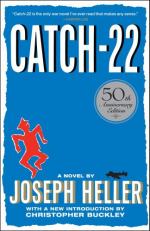|
This section contains 1,228 words (approx. 5 pages at 300 words per page) |

|
Hailed as "a classic of our era," "an apocalyptic masterpiece," and the best war story ever told, Joseph Heller's blockbuster first novel, Catch-22 (1961), not only exposed the hypocrisy of the military, but it also introduced a catchphrase to describe the illogic inherent in all bureaucracies, from education to religion, into the popular lexicon. The "Catch-22" of the novel's title is a perverse, protean principle that covers any absurd situation; it is the unwritten loophole in every written law, a frustratingly elliptical paradox that defies solution. As Heller demonstrates in his novel, Catch-22 has many clauses, the most memorable of which allows only crazy men to be excused from flying the life-threatening missions ordered by their military superiors. To be excused from flying, a man needs only to ask for release; but by asking, he proves that he is sane and therefore he must continue flying. "That's some catch...
|
This section contains 1,228 words (approx. 5 pages at 300 words per page) |

|


